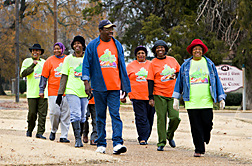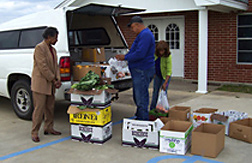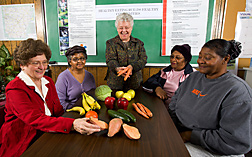Changing Lifestyles To Fight Obesity in the Delta
|
|
Residents of the Lower Mississippi River Delta are linked by the muddy waters flowing through the region and by a common culture, including unique music, literature, and food. Though lower Delta states share a rich heritage, they also form one of our nation’s most impoverished and poorly nourished regions.
On average, diets in Arkansas, Mississippi, and Louisiana include 20 percent fewer vegetables and fruits, less dairy products and more added sugar and calories from fat than the national average. Obesity and chronic diseases, such as heart disease, stroke, and cancer, affect people living in Mississippi Delta states more than other U.S. residents.
Congress created the Lower Mississippi Delta Nutrition Intervention Research Initiative (NIRI) to address the health problems of residents in the three states. Before NIRI was established, research on the dietary habits of this population was lacking. Since 1995, researchers at NIRI headquarters in Little Rock, Arkansas, have been working with their cooperators to find ways to improve the nutrition and health of the men, women, and children of the Delta.
Better Lifestyles Through Science
The Agricultural Research Service is partnered with six universities, state cooperative extension services, rural communities, and other partners in the three-state region. NIRI researchers have conducted and will continue conducting a series of surveys to assess the nutrition and health needs of the Delta region.
Over time, NIRI partners selected three communities in the Delta region for the initial intervention research efforts. NIRI will help guide these communities for the next several years, while tracking changes in their members’ nutrition and health.
These communities—Marvell, Arkansas, and its surrounding public school district; Franklin Parish in Louisiana; and the city of Hollandale, Mississippi—were chosen because of the high levels of enthusiasm community leaders have shown in the past towards the NIRI program and the dedication community members previously demonstrated towards their ability to work together at improving their overall fitness and health.
“These communities are each unique. They happen to include a school district, a parish, and a city because they each define themselves differently,” says Beverly McCabe-Sellers, a nutrition scientist and NIRI’s research coordinator. “Not only do they have different geographic boundaries, but they each define ‘community’ differently.”
Part of the problem Delta residents face when searching for healthy food items is the distance they must travel to find full-service grocery stores. A NIRI study of 228 stores chosen at random in the three-state region found that convenience stores outnumber supermarkets and smaller grocery stores. They found most convenience stores have fewer healthy foods and higher prices.
Currently, NIRI communities are enthusiastically implementing intervention research to improve individual residents’ health and nutrition. Using the community-based participatory research model as the basis for carrying out the Delta NIRI mission, schools and community organizations in each state are using intervention research to address such concerns as food choices, eating patterns, food insecurity, and maintaining healthy weights.
At the same time, NIRI scientists and communities are analyzing the success of the intervention research and will determine which methods can be used to carry out these programs in other rural communities of the Lower Mississippi Delta.
According to Margaret L. Bogle, a nutritionist and Delta NIRI’s executive director, “NIRI partners will share what they’ve learned about which interventions are successful, while improving the communities’ capabilities to carry out these types of programs in the future.”
|
|
Communities Choose Their Paths
Marvell is one of the three communities chosen for the initial nutrition intervention research,and it serves as a good example of the persistence and dedication that will be required to make this ambitious program successful.Though the school district of Marvell is rural and contains a small town, NIRI was able to find local residents with the knowledge, experience, and enthusiasm needed to organize and run the program.
Marvell initiated a walking club in which dozens of residents are now taking part. Participants strap on pedometers and don their club T-shirts each week to get in a good workout with friends. Once a month, the Marvell Walking Club meets over a healthy breakfast. Health professionals are invited to give them health, nutrition, and physical fitness advice.
“Community members say they have more energy, sleep better and feel better, and have less joint pain,” says Willie Allen, NIRI’s community coordinator and representative from the University of Arkansas Cooperative Extension Service.
|
|
Marvell already had a walking trail, but NIRI and the city recently received a state grant to refurbish it. Adding benches, lights, new pavement, trees, and a water fountain will help create a more appealing environment for exercisers. The city also received a grant to create a farmer’s market, which will bring fresh produce closer to residents.
Long-time Marvell residents like Dianne Sims, a NIRI community outreach assistant, remember in years past when backyard gardens were more popular in their town. Now, they say, it seems to have become a dying practice in the region. This could change in Marvell beginning with the formation of three community gardens, which provide healthy fruit and vegetables for residents. Volunteers last summer grew a first-year harvest of lettuce, tomatoes, carrots, squash, green beans, onions, beets, cucumbers, peppers, and herbs on one small raised-bed plot lined with a few dwarf fruit trees behind the school district’s administration building.
The goal is to encourage residents to start gardens for themselves and enjoy the fruits (and vegetables) of their labor. In the future, the Marvell program intends to deliver the produce to senior citizens who can’t garden for themselves. Participants say they appreciate the bonus of the physical activity that gardening requires. A third initiative in the works will build on the consumption of more fruits and vegetables and encourage more healthy food choices by residents.
“If we’re going to have a healthy community, we need healthy individuals,” says Beatrice Shelby, a Marvell NIRI participant and local community activist. “This has the potential to be a really great community organization. People are coming to the table and acquiring the skills they need to advocate on their own behalf.”
The city of Hollandale has mainly focused on one initiative: Forming an advanced walking club with nutrition components. Community leaders have received training to become certified instructors, or “coaches.” Local coordinators have worked with NIRI to install a walking trail, a basketball court, and a soccer field in a city park.
In Franklin Parish, local NIRI coordinators are working to expand a weekly truck delivery, or “rolling store,” of fresh produce and healthy recipes to about 100 participants. The pilot program was successful, and they hope to join forces with a local grocery store to stock fresh fruits and vegetables for participants holding special vouchers.
With the goal of improving access to healthy food choices, the Franklin Parish NIRI is starting a project called “People United to Sustain Health” (PUSH), which could be implemented throughout the Delta if it’s successful after 2 years. NIRI plans to screen participants’ health with such indicators as body fat percentage and blood pressure, before and after implementing the program, to gauge its effectiveness. PUSH includes use of local health educators to promote healthy food choices and physical activity as well as the rolling store.
“Programs sponsored by Delta NIRI help get the word out that a diet of high-fat foods and a lack of variety, combined with scarce physical activity and medical care, increase the risk of nutrition-related chronic diseases, especially obesity,” Bogle says. “Since obesity rates are much higher in the Lower Mississippi Delta, it is of major concern. For many, weight loss is the most important factor towards better health.
“At the same time, rural communities are learning what to substitute to improve their lifestyles in the areas of nutrition and physical activity. Ultimately, such interventions can empower community members to sustain these initiatives for a healthy future for their families.”—By Jim Core, Agricultural Research Service Information Staff.
This research is part of Human Nutrition, an ARS National Program (#107) described on the World Wide Web at www.nps.ars.usda.gov.
Margaret L. Bogle is with the USDA-ARS Lower Mississippi Delta Nutrition Intervention Research Initiative, 900 South Shackleford Rd., Suite 509, Little Rock, AR 72211; phone (501) 954-8882, fax (501) 954-9596.
"Changing Lifestyles To Fight Obesity in the Delta" was published in the March 2006 issue of Agricultural Research magazine.










